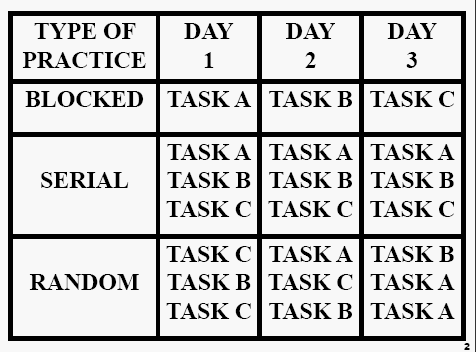
Re-order your topics and subjects in an interleaved fashion. This way you’ll prevent yourself from boredom and continuously trigger your brain to new things.
In the long run switching randomly through subjects will improve your ability to acquire and retain the new piece of information at hands. It’s like tasting a bit of every chef’s dish to refine your palate instead of stuffing yourself with eating only one dish per meal. Trust your mind. It will reorder and complement all the new pieces of information gathered.
Randomizing your practice subjects is absolutely crucial to your performance development and this is explained by neuroscience. Our brain reacts more effectively to change, rather than repetition.
Repetition makes you bored and dull. The process of habituation leads to autopilot actions, meaning, non-deliberate practice, non-mindful practice, therefore repetition leads to mindless practice.
Change makes you attentive and alert because new stimuli activates the brain and keeps it activated for longer periods of time. So, every time you feel loosing your attention, instead of re-focusing on the task at hands, why don’t you introduce a new element into that task in order to feel a burst of novelty? Change leads to deliberately engaged focused practice.
Repetition based practice is called Blocked Practice. Each exercise is scheduled in a row, favouring muscle memory. Play lick nº1 ten times; play lick nº2 ten times; play lick nº3 ten times; etc. AVOID THIS PRACTICE! It will make you feel more comfortable and momentarily improved, but it won’t last long. This is called cramming (remember those frantic study sessions right before a test? How much information did your brain retain in the following days? Close to none, probably? 😉 )
This is the method that favours performance optimization, not learning optimization. This process can be better suited as a warm up before a concert but does not make your practice durable. Blocked practice is just a way for you to feel stronger and capable during practice.
If you are focused on long-term results you must invest on learning optimization. Random Practice improves the quality of your learning abilities, not your muscle memory. Prepare your muscles with repetition. But prepare your mind with change, novelty, alternation and arbitrariness.
Repetition will only improve your playing DURING practice, and then the improvement fades away. Change will improve your learning and retention AFTER practice and endures through time.
Random Practice also motivates you to set goals. Try it! It looks like this:
- Pick a few topics to work on (ideally up to 4 is better for your brain, not more);
- Randomize and alternate the tasks at hand;
- Set an alarm clock to remember it’s time to change exercise and keep you engaged.


